Porsche Casts Doubt Upon Combustion Ban Timeline

While we’re constantly hearing about tightening emissions regulations, the relevant timelines issued by government actors are rarely adhered to. Electric vehicle subsidies went from temporary to indefinite and combustion bans have gone from right around the corner to anyone’s guess. This is also true of the industry itself, which often makes bold promises designed to appease a subset of the public only to repeatedly move the target date back a few years.
With this in mind, Porsche’s CFO was recently quoted as saying European combustion bans will probably need to be delayed and there’s good reason to believe him.
As things currently stand, the European Union has plotted banning the sale of new combustion-engine cars by 2030. However, Porsche Chief Financial Officer Lutz Meschke was quoted by Automotive News on Thursday casting some doubts.
"There's a lot of discussions right now around the end of the combustion engine," Meschke said in Singapore. "I think it could be delayed."
Despite Europe having adopted battery electric vehicles far more quickly than North America, the market is still confronting a lot of the same problems. In 2022, the EU estimated that 21.6-percent of all new car registrations were electric vehicles. That number was presumed to be around 5.9 percent in the United States, according to data accumulated from Kelly Blue Book.
While the EU does tend to lump plug-in hybrids into EV sales tabulations, the region is still outpacing the United States and Canada in terms of both PHEV and BEV volumes. But we continue to see similar complaints about public charging sites, fumbled vehicle launches, and have witnessed global electric sales begin to plateau by summer of 2023. Manufacturers have also signaled they’ll need more time to finish constructing EV facilities and started grumbling about subsidies being cut off.
It appears that European electrification efforts are confronting the same issues faced everywhere — leading to predictable results. UK Prime Minister Rishi Sunak announced the country would be pushing back a national combustion ban until 2035 last September and everyone is wondering if the European Commission will follow suit.
From Automotive News Europe:
A slowdown in EV orders has thrown into question whether the European Union is on track for the phaseout, which represents one of the most ambitious efforts to curb carbon emissions.
The region's consumers have been put off by a lack of reliable charging networks, persistently high prices and the rollback of EV incentives. The U.K. has already postponed its planned ban of new gasoline and diesel models by five years to 2035.
While manufacturers of premium and luxury EVs can work without subsidies, cutting them from the volume segment is wrong, said Meschke, who spoke on the sidelines of the unveiling of Porsche's long-delayed electric Macan SUV.
"We have to see how steep the ramp-up curve is in coming years," Meschke said. "If we have a situation like now, with certain reluctance to buy electric cars in Europe, then maybe the subsidies will come back."
Your author has repeatedly suggested ending electric vehicle subsidies, so it’s impossible to provide an unbiased take on the value of EV subsidies. The issue has also become stupidly divided along political lines, ensuring that hoards of people will cheer for opposing outcomes without giving it much thought. But it’s undeniable that the automotive sector is highly influential thanks to aggressive lobbying efforts and grossly overestimated its abilities to transition toward all electric vehicles.
Some have even alleged that the industry has intentionally sabotaged electric vehicles to use them as a scapegoat for controversial technologies companies wanted to pioneer before moving them into mainstream combustion models. That perhaps requires too much creative thinking to be seriously entertained without hard evidence. Botched product launches can be attributed to a generalized downturn in quality control and an over-reliance on software. Loathed public charging stations (Tesla Superchargers excluded) may also just be the result of the involved companies underestimating the level of maintenance required.
But the above doesn’t preclude automakers from wanting to take advantage of government money. As part of Volkswagen Group, Porsche is technically supposed to be committed toward transitioning its fleet to all-electric vehicles. However, the company is also trying to pioneer synthetic fuels (often called “e-fuels”) it has framed to the public as environmentally sound. Germany even found itself at odds with the European Commission after the latter decided against categorizing vehicles using synthetic fuel to fall outside prospective combustion bans. The reasoning behind this looks to be purely economical, as Germany sees e-fuels as a burgeoning industry with serious potential that it also just happens to be leading.
The largest piece of the puzzle is likely public opinion, however. Despite years of the industry trying to assure drivers that EV costs would be even to combustion vehicles by 2025, we’re not even close to that becoming a reality. Electric automobiles tend to be purchased by wealthier individuals as a secondary vehicle and (with notable exceptions) trade at much higher prices. They also depreciate more quickly, making them less attractive to the kind of people that care about resale values.
These factors have joined together with evaporating incentives to paint kind of a bleak picture for mainstream electrification. EV volumes remain slanted toward the luxury market at a time when the average person's purchasing power has declined, leaving the truly economical models to compete directly with gasoline-reliant alternatives boasting lower price tags. Assuming EVs offered a superior experience across the board, this wouldn’t be an issue. But electric cars tend to thrive under specific use cases, whereas combustion vehicles tend to be versatile and already have an established infrastructure to support them.
Now we're seeing automakers and governments that have been blindly championing the creation of "ultra-low emissions zones," and endorsing a forced pivot toward all-electric vehicles, openly questioning the feasibility of the very thing they've been fighting for since the early 2000s. We should probably take Porsche’s comments seriously.
[Image: Porsche]
Become a TTAC insider. Get the latest news, features, TTAC takes, and everything else that gets to the truth about cars first by subscribing to our newsletter.

A staunch consumer advocate tracking industry trends and regulation. Before joining TTAC, Matt spent a decade working for marketing and research firms based in NYC. Clients included several of the world’s largest automakers, global tire brands, and aftermarket part suppliers. Dissatisfied with the corporate world and resentful of having to wear suits everyday, he pivoted to writing about cars. Since then, that man has become an ardent supporter of the right-to-repair movement, been interviewed on the auto industry by national radio broadcasts, driven more rental cars than anyone ever should, participated in amateur rallying events, and received the requisite minimum training as sanctioned by the SCCA. Handy with a wrench, Matt grew up surrounded by Detroit auto workers and managed to get a pizza delivery job before he was legally eligible. He later found himself driving box trucks through Manhattan, guaranteeing future sympathy for actual truckers. He continues to conduct research pertaining to the automotive sector as an independent contractor and has since moved back to his native Michigan, closer to where the cars are born. A contrarian, Matt claims to prefer understeer — stating that front and all-wheel drive vehicles cater best to his driving style.
More by Matt Posky
Latest Car Reviews
Read moreLatest Product Reviews
Read moreRecent Comments
- Fred No idea why someone would interested in buying this at the price point. I'm pro-ev but a quick search can pull-up a lot more value at lower costs. I like the Fiat design but I couldn't stomach paying $37k for limited range and a super tight back seat.
- 28-Cars-Later For the you-gotta-be-rich-to-afford-a-cheap-car crowd, Versa is the winner here IMO. Buy it new and pay the $300ish (?) note, but enjoy at least five years with relative reliability assuming historical average miles. Based on MY19, Manheim expects the "S" to be worth $5,975 in roughly five years with "retail" value being $12,650. Nissan and other second or third tier marques will give more on a new trade so assuming 20 OTD with incentives its a 12K/$2,400 depreciation over 5 years excluding interest and it probably could be kept another year or two before the Nissan in it starts to show. Mirage in this comparison is the new buy used on the cheap and run it till the wheels fall off. I'm loathe to compare it to either the Panther or 240 (since I don't believe it could physically last as long as either) but something in the vein of car you could repair yourself on the cheap which was originally intended for Third World conditions. Based on MY19, the ES hatch is worth $4K even with avg miles of 72,740 and "retail" value at $9,650. I personally see it as lot poison and could see savvy buyers making off with one of these near or below wholesale while Nissan is a staple of the subprime crowd and is much easier to finance. MC beings up an interesting contender in the used Chevy Bolt, whose wholesale is $12,050 for MY19 in LT trim with avg lower miles of 33,017. While this is very intriguing, financing is going to be the story here since Nissan or I imagine Mitsubishi could put buyers into half decent rates despite poor credit where a Bolt is "going to the street" and getting whatever high rate is being offered now. Assuming one can handle their own charging, Bolt does offer a lower maintenance cost and used I believe buyers have a higher chance of a white collar professional's commuter condition than what they will find in a used Nissan or Mitsu runabout. The risk to our theoretical buyer IMO is that the Bolt will straight up fail at some point in the future, either not take a charge or even turn on and for the higher wholesale entry point I say the Mitsu is a better choice since it likely won't completely fail and can very cheaply be replaced. Additional: For your kid/nephew/niece/any "middle class" child, I think Bolt is probably the better proposition here but I'd be out of the trade in 36 mos personally. For those truly on their own with no emergency support system, I'd shy away.
- Jbltg It's interesting to note that in the Japan domestic market, where cars are built to order and dealers maintain barely any stock, that there are many, many color options. Really good ones, but no one seems to bite. Most of the cars on the road there are the same boring colors that we have. Go figure.My pet peeve is black interiors. Too depressing, and shows every speck of dust and dirt.
- IBx1 Dealerships flood the market with grayscale cars to commodify them and drive down resale value. Green and yellow cars hold their value best because they cannot easily be replaced, but you can throw a rock and hit fifty shades of gray.
- SCE to AUX Appliances (household and vehicular) have limited color choices, that's why.But today, if you want a crazy color, just buy a plain one and get it wrapped.



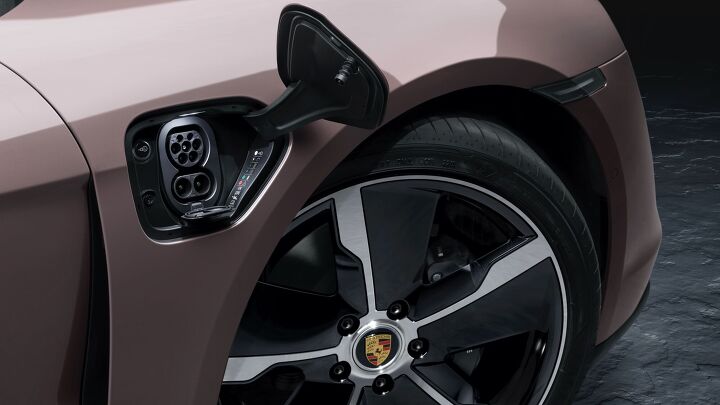












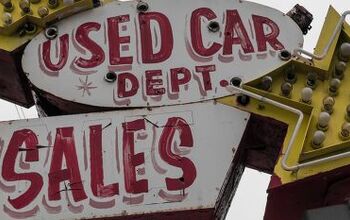










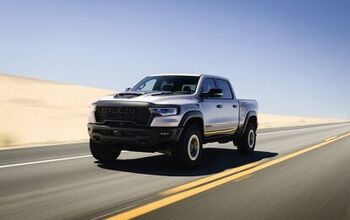

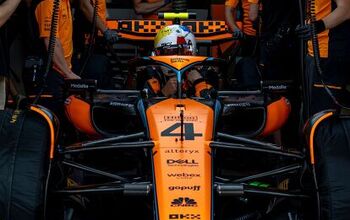



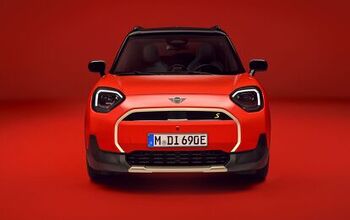
Comments
Join the conversation
Relevant
Peter Puffers! TTAC B&Bers in Disguise!